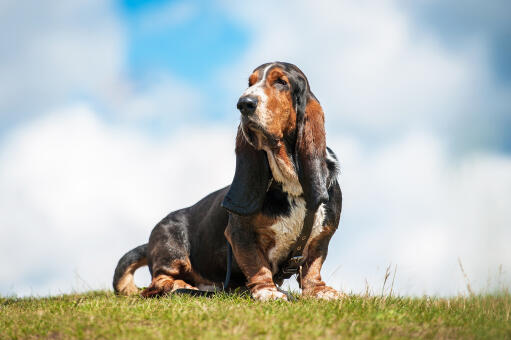Basset Hound Dogs












History
It is believed that Basset Hounds originated in France, where they were used for hunting prey such as rabbits and hares. "Basset" is derived from the French word 'bas' meaning low thing or dwarf. In the late 1800's/early 1900's the breed was crossed with Bloodhounds to increase their size. Basset hounds were first introduced to Britain in the late 1800's and soon became a firm favourite.
Behaviour
Basset Hounds are wonderfully good natured and calm dogs. They get on well with other dogs, pets and children. It is often called 'The Clown of the canine world, as they are a fun breed that like company, unhurried walks and sleeping on your lap on the sofa. Even with their slower paced attitude to life, they still need regular exercise to prevent obesity. They are always hungry and will steal food given half a chance. Due to their nose, they will suddenly run after a scent and not come back, so walking on a lead or in a secure area is best. When they have found a scent they will sing or 'bay' when excited. Their tracking nature makes training a challenge but they do respond to food which makes the job easier, but slow. With smooth coats, grooming is minimal, but their faces need regular washing as they have a tendency to drool. Due to their stocky frame and short legs, Basset Hounds can suffer from back problems and will need lifting into the car and a helping hand on to the sofa.
Temperament
It is no mistake that the Basset Hound has developed a reputation for being a loveable friendly dog. The temperament of these dogs is good natured, emotional and loving. Bred for a slower pace of hunting they enjoy the outdoors just as much as they love to snooze a lazy Sunday afternoon away.
Docile with children and other dogs don't expect a bouncy playful dog but more a loveable companion that will be sniffing around and drooling at any scent that takes his fancy.
Health Problems
Health problems that are associated with Basset Hounds include canine hip dysplasia (CHD), elbow dysplasia, ear problems, eye problems, bloat and Von Willebrand's Disease (a usually mild bleeding disorder).
Breed Details
- Status: Common
- Life Expectancy: 11 - 12 years
- Weight: 25 - 34 kg
- Rare: No
- Coat: Short
- Grooming Requirements: Once a week
- Town or Country: Either
- Minimum Home Size: Large House
- Minimum Garden Size: Small to Medium Garden
- Breed Type: Hound
- Size: Large
- Energy Level: Medium
- Exercise Required: Up to 1 hour
















